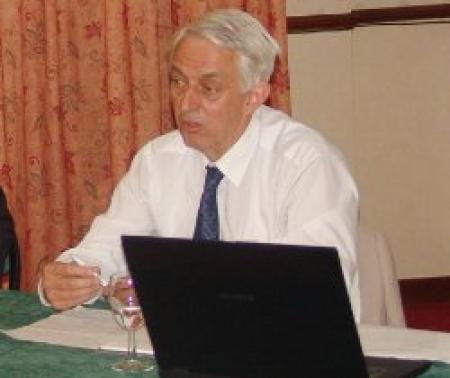ID :
93621
Mon, 12/07/2009 - 18:35
Auther :
Shortlink :
http://m.oananews.org//node/93621
The shortlink copeid
Justice needed for sustainable global security : UK professor

London, Dec 7, IRNA — A prominent professor of peace studies says administration of justice and not the use of military means is necessary to subdue threats to global security in the current century.
Professor Paul Rogers, from the University of Bradford, told IRNA that the “disastrous” war on terror has reached its end without achieving anything valuable.
“So far, more than 100,000 people have been killed in Iraq, 120,000 detained without trial at different times, some for several years and four million have been abandoned as refugees.”
He said insecurity and violence are continuing in Iraq and the war now enters into its ninth year in Afghanistan.
In his latest report on the war on terror, Rogers highlighted the necessity of the dispensation of justice as a way to tackle global threats.
“The war on terror has been a disaster, but recognising its failure might at least help us develop our understanding of global security in a manner appropriate to the 21st century,” he said, urging the formation of a sustainable security paradigm based on “emancipation and justice” and not “traditional military means”.
Rogers said the al-Qaida should have been seen as a “transnational criminal movement” rooted in an extreme and unbalanced interpretation of one of the world's great religions.
“It was not a worthy enemy to be fought by traditional military means, but a criminal and extreme entity to be pursued by policing and international legal processes.”
Asked about the possibility of winning the war on terror, the global security consultant to Oxford Research Group said it could be won by going to the root of “why al-Qaida has generated and maintains sufficient support to function as a dangerous movement.”
Rogers explained that it was a “mistake” from the first place to wage wars on Afghanistan and Iraq.
“The war in Afghanistan has entered its ninth year with more troops being poured into the country as the Taliban and other paramilitary groups increase their areas of influence and outright control.”
He added that the transition of Afghanistan to a “peaceful pro-western state” has instead been replaced by a “bitter and increasingly violent insurgency” involving rapidly increasing numbers of NATO troops, as well as “rampant corruption and maladministration” within the Karzai government.
Asked about the Iraq Enquiry Committee findings in UK, Professor Rogers said they are tending to show what was previously believed “that there was a determination by the Bush administration to terminate the Saddam Hussein regime, whether or not there was UN approval”.
“The war on terror has so far had results that have been massively costly in human terms and deeply counter-productive for the United States”.
Professor Paul Rogers, from the University of Bradford, told IRNA that the “disastrous” war on terror has reached its end without achieving anything valuable.
“So far, more than 100,000 people have been killed in Iraq, 120,000 detained without trial at different times, some for several years and four million have been abandoned as refugees.”
He said insecurity and violence are continuing in Iraq and the war now enters into its ninth year in Afghanistan.
In his latest report on the war on terror, Rogers highlighted the necessity of the dispensation of justice as a way to tackle global threats.
“The war on terror has been a disaster, but recognising its failure might at least help us develop our understanding of global security in a manner appropriate to the 21st century,” he said, urging the formation of a sustainable security paradigm based on “emancipation and justice” and not “traditional military means”.
Rogers said the al-Qaida should have been seen as a “transnational criminal movement” rooted in an extreme and unbalanced interpretation of one of the world's great religions.
“It was not a worthy enemy to be fought by traditional military means, but a criminal and extreme entity to be pursued by policing and international legal processes.”
Asked about the possibility of winning the war on terror, the global security consultant to Oxford Research Group said it could be won by going to the root of “why al-Qaida has generated and maintains sufficient support to function as a dangerous movement.”
Rogers explained that it was a “mistake” from the first place to wage wars on Afghanistan and Iraq.
“The war in Afghanistan has entered its ninth year with more troops being poured into the country as the Taliban and other paramilitary groups increase their areas of influence and outright control.”
He added that the transition of Afghanistan to a “peaceful pro-western state” has instead been replaced by a “bitter and increasingly violent insurgency” involving rapidly increasing numbers of NATO troops, as well as “rampant corruption and maladministration” within the Karzai government.
Asked about the Iraq Enquiry Committee findings in UK, Professor Rogers said they are tending to show what was previously believed “that there was a determination by the Bush administration to terminate the Saddam Hussein regime, whether or not there was UN approval”.
“The war on terror has so far had results that have been massively costly in human terms and deeply counter-productive for the United States”.





